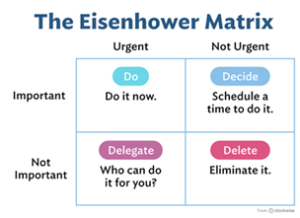Preparing for competitive exams can be overwhelming, but with the right time management tips, students can make the most of their study hours and stay ahead in the race. Balancing multiple subjects, mock tests, revision, and personal time requires a smart and structured approach. In this blog, we’ll explore proven strategies to help students plan their schedule effectively, set achievable goals, and maintain consistent focus—ensuring they prepare smarter, not harder.
Importance of Time Management
If you are someone who delays their task until the very end and dreads every minute you wasted avoiding the task. You have come to the right place. Time is surely an essential resource for human beings. Time gone does not come back, and you cannot buy time.
As a student, it becomes more important to use your time effectively, especially with the ever-so-distracting surroundings.
Time Management is the basic skill of using one’s time effectively and productively to yield the best results. But what if we don’t manage our time well?
Consequences of poor time management
The large amount of syllabus and material to be covered makes students overwhelmed and hopeless, and stressed. Poor time management not only makes it difficult to complete a task effectively, but it also has psychological and physical implications.
Poor time management has been linked to increased stress and anxiety when an individual fails to meet their deadline and constantly struggles to complete their task on time. Constant stress and dissatisfaction could lead to depression and emotional distress. Other consequences of poor time management include decreased productivity and work quality, academic underperformance, sleep deprivation, unhealthy lifestyle patterns and impaired cognitive functioning like decision-making.
Mastering your time and managing it well not only reduces mental stress, it gives you an edge. Sticking to your schedule gives you extra time to revise just before the exam, you are less stressed and tensed and also you don’t lose balance between your academic life goals and your personal life with oneself and family.
Time Management Tips and Techniques
Tired of struggling with managing your time well? Here is your guide to mastering your time.
1. Pomodoro technique
Pomodoro technique is the act of focusing on a task for a certain amount of time, let’s say 25 minutes or 50 minutes, followed by a short break of 5 minutes or 10 minutes, respectively.
The Pomodoro technique ensures all your attention goes to one task at a time, increasing productivity and preventing you from burning out.
Studying for longer hours at a time might not work for every student, as it burns out one’s mental health. According to psychology, the Pomodoro technique is based on the attention span of humans, which is limited to intense attention up to 10-20 minutes. This reduces cognitive overload on the brain and sustains concentration.
2. Eisenhower Matrix

Eisenhower Matrix is a time management tool that helps organise tasks into four quadrants.
They are as follows-
- Important and Urgent- to be done immediately
- Important but not urgent- to be scheduled for later
- Not important but urgent- to be delegated to others
- Not important nor urgent- to be deleted or eliminated
This tool helps individual prioritize task and avoid unnecessary distractions. This not only boosts one’s productivity but it also fosters better mental clarity and hence better mental health.
A lot of times, students end up wasting their precious time on less important tasks. This tool helps them schedule their study time better and more effectively.
3. Prioritising
The most elementary technique to manage one’s time is to prioritise.
Prioritise the significant task first. And it’s not only about certain tasks, it’s about the prioritisation of your mindset, your goals, your dreams before the distractions and obstacles that are stopping you.
Rather than opening your social media first thing in the morning, try to complete your study goal first. It saves your mind from the dopamine rush as well as helps you sustain your focus and concentration for a longer period. Thinking where to start? Write down three important tasks you want to achieve today and accomplish all of them one by one. It gives clarity and helps you feel less overwhelmed.
4. Creating a schedule
If you are a student, you might have made a timetable for yourself various times in your academic life. But we all know it was hard to follow.
Time tables are fixed list of times at which specific events, task, or activities are to take place, whereas schedules are a much more broader and flexible list of time or dates for events, task or activities to take place.
The more scientific and effective ways of creating a schedule are the following-
- Thoroughly review the exam syllabus and question paper pattern to understand the weightage of each topic and subtopic. Also, identify high-scoring areas and areas that require more deeper understanding.
- Set clear and realistic goals so that you don’t overwhelm or burn yourself out. Break down your goals into smaller, achievable task and assess them and track your progress weekly or/and monthly.
- Consider your difficult subject and weak areas under the urgent and important task of the eisenhower matrix to avoid last moment panic and stress.
- Schedule and allocate time slots for challenging topics during your peak energy hours. Morning for theoretical subjects, afternoon for practice-based subjects and evenings for revisions and mock tests and nights for light readings.
- Create a balanced daily routine which consists of study sessions, breaks, physical activity, meals and adequate sleep.
- Set aside time for periodically assessing your progress and adjust to these insights. Also dedicate the last two weeks before the exam solely to revision and mock tests.
Remember, don’t set unrealistic goals and don’t overload your schedule. Balance is the key.
Bonus Time Management Tips
Here are some bonus tips for you.
Don’t skip two days in a row
Breaking the habit breaks the momentum of the brain. Skipping for more than two days can make it harder for the brain to get back on track. If you missed to study one day due to other commitment, try not continue to miss you study sessions, as the more delay you make, the difficult it becomes for the brain to get back to sitting for the study sessions.
Don’t rely on motivation
Motivation is a form of feeling that makes you want to do a certain task. But feelings are short-lived. Relying on motivation to start preparing for your exams could not go very well, because as soon as you start finding it difficult, your motivation will vanish.
Therefore, it’s important to cultivate discipline. Discipline is doing the task even if you don’t feel like doing it.
Cultivating discipline takes time. Write down your goal and why you want to achieve it; that will act as an anchor when you feel lost.
Conclusion
In conclusion, effective time management is indispensable for students preparing for competitive exams. By employing proven strategies like the Pomodoro Technique, Eisenhower Matrix, and clear prioritisation, students can optimise their study sessions, reduce stress, and maintain a healthy balance between academics and personal life. Crafting a flexible yet disciplined schedule, tracking progress, and building consistent habits are crucial for sustained motivation and success.
Remember, discipline—not just motivation—keeps you going, and skipping more than a day can disrupt your momentum. Ultimately, mastering time management empowers students to approach exams with confidence, clarity, and the best chance of achieving their goals.
Also Read: How to Improve Focus and Concentration for Exams – Top Study Tips





